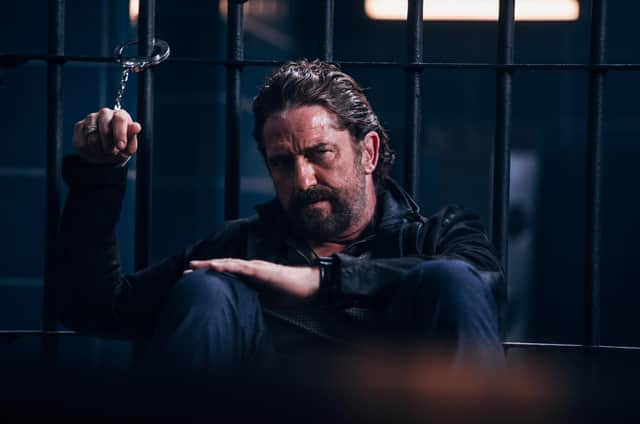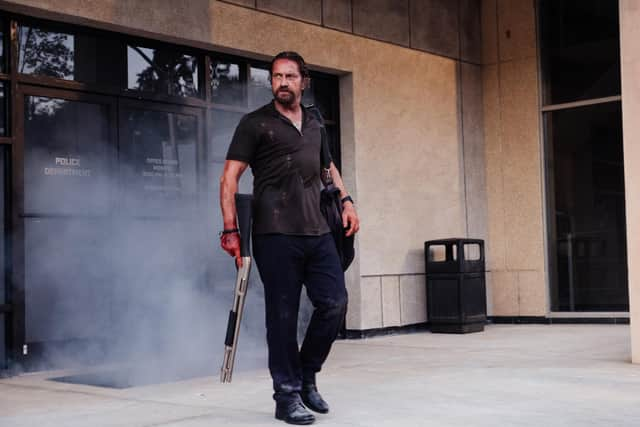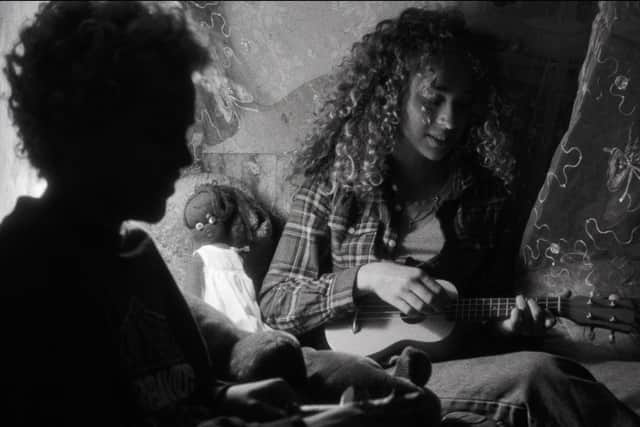Film reviews: Copshop | Herself | Sweet Thing | The Lost Leonardo


Copshop (15) **
Herself (15) ***
Sweet Thing (15) ****


The Lost Leonardo (15) ****
At a time when any actor can play a superhero, Gerard Butler and Frank Grillo have carved out a niche for themselves in action movies that require a gruff brand of machismo that’s a little more old school. Butler, of course, has A-list blockbuster clout, but even the B-movies that Grillo headlines when not playing supporting roles in franchise films showcase a tough-guy intensity that few modern movie stars can really pull off. In theory, then, a film that pits them against each other as rival criminals who wind up in the same prison should be a riot, especially with Butler playing a hitman hired to kill Grillo’s con artist. But Copshop is largely a bore thanks to co-writer/director Joe Carnahan leaving their characters inactive for too much of the running time while their rookie cop jailer (Alexis Louder) figures out which one of them she can trust after a corrupt colleague and a rival assassin turn her police station into a shooting gallery.
A blatant nod to John Carpenter’s Assault on Precinct 13, the premise may have a certain pulp swagger (and Louder – one of the stars of HBO’s excellent Watchmen adaptation – more than holds her own as the film’s other co-lead), but Carnahan’s insouciant attitude to gunplay and penchant for silly comedic flourishes succeed only in lowering the stakes at the precise moment the scenario’s pressure-cooker tension should be escalating. By the time Butler and Grillo do finally go mano a mano, it’s tough to care about which one is going to come out on top, let alone work up any enthusiasm for the sequel the film’s bizarre ending seems intent on setting up.
Advertisement
Hide AdThere’s a great scene early on in Herself that captures the precariousness of its protagonist’s horrible situation in one elegant shot. It features the film’s star Clare Dunne (who also co-wrote it) slumped against the wall of an airport parking lot, her character, Sandra, lit by a shaft of light streaming in from a gap in the roof through which a plane can be seen passing overhead. Sandra, who works a cleaner, is temporarily living at the airport’s hotel, having recently fled with her two young daughters from her violently abusive husband. As she absorbs what few moments of joy she can from watching her girls rollerskating between the parked cars, the passing plane signifies her proximity to an escape that remains cruelly just out of reach thanks to a legal system and an out-of-control housing market that can trap women like her in dangerous situations even after getting away from an immediate threat.


Not that physical violence is easy to escape just by walking away. One of the other things director Phyllida Lloyd (best known for Mamma Mia! and The Iron Lady) does well here is convey the residual effects of trauma by editing together discrete flash-cuts of the assault on Sandra to simulate the panic attacks she now experiences. These early scenes suggest we’re in for a punishing cinematic ride, but as the plot takes shape around Sandra’s efforts to build her own home in order and bypass the bureaucratic nightmare of Ireland’s public housing system, it becomes instead a more schematically uplifting story about rebuilding a life and having faith in the inherent goodness of others.
The allegorical simplicity of what follows is reflected in both the barely defined supporting cast and the film’s subsequent reliance on cheery montages featuring Sandra’s diverse crew of volunteers happily mucking in while on-the-nose empowerment anthems blast away on the soundtrack. It’s effective in an emotive kind of way, but slightly undercuts the subtler work Dunne and Lloyd do elsewhere.
US independent filmmaker Alexandre Rockwell was an early contemporary of Quentin Tarantino, whose Reservoir Dogs Rockwell’s own Steve Buscemi-starring breakthrough, In the Soup, beat to win the grand jury prize at the 1992 Sundance Film Festival. Though he went on to collaborate with Tarantino by directing one segment of the ill-fated Four Rooms (1995), his subsequent output never really broke out of the film festival ghetto. Given how wonderful his new film Sweet Thing is, that’s too bad.
Granted, a certain nostalgia for the grainy aesthetics of early 1990s indie cinema might aid one’s appreciation of this fairytale-like coming-of-age story about the misadventures of a couple of latchkey siblings (played by the director's own children, Lana and Nico Rockwell). But if the black-and-white style seems anachronistic, a judicious use of colour in moments where the kids feel totally free puts a twisted spin on The Wizard of Oz, poetically underscoring the limitations frequently imposed on them by the dysfunctional adult world of their separated and struggling parents (Will Patton and Karyn Parsons).


The despicable way art becomes currency is the subject of The Lost Leonardo, a snappy investigation into how a painting bought for a little over $1,000 was contentiously identified as a da Vinci original and ended up being sold at auction for $450 million. Starting out as a story about the dubious provenance of a work of art dubbed “the male Mona Lisa”, the film gradually morphs into the documentary equivalent of a Christopher Nolan movie, taking on the characteristics of a high-stakes thriller full of nefarious, well-funded participants who seem more interested in making the price tag itself the work of art.
Advertisement
Hide AdCopshop and Herself are in cinemas from 10 September; Sweet Thing and The Lost Leonardo are on limited release and available digitally on demand from 10 September
A message from the Editor:
Thank you for reading this article. We're more reliant on your support than ever as the shift in consumer habits brought about by coronavirus impacts our advertisers.
If you haven't already, please consider supporting our trusted, fact-checked journalism by taking out a digital subscription at https://www.scotsman.com/subscriptions